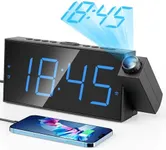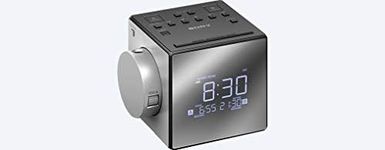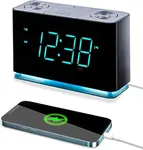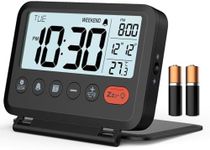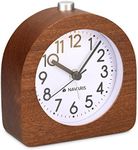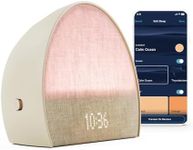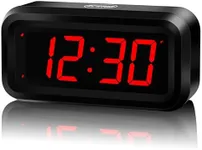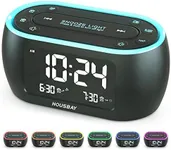Buying Guide for the Best Alarm Clocks
Choosing the right alarm clock can make a big difference in how you start your day. With so many options available, it's important to think about your personal needs and preferences. Consider what features will help you wake up most effectively and comfortably. Think about your sleeping habits, the environment in your bedroom, and any special requirements you might have, such as needing a loud alarm or a gentle wake-up light. By understanding the key features of alarm clocks, you can find one that fits your lifestyle and helps you wake up on the right foot.Alarm TypeThe alarm type refers to how the clock wakes you up, such as with a buzzer, radio, music, or light. This is important because different people respond better to different types of alarms. Buzzers are usually loud and effective for heavy sleepers, while gentle sounds or gradual light can be better for light sleepers or those who want a less jarring wake-up. When choosing, think about what kind of wake-up experience you prefer—do you need something strong to get you out of bed, or do you want a more peaceful start to your day?
Display Type and BrightnessDisplay type covers whether the clock uses LED, LCD, or analog faces, and brightness refers to how much light the display emits. This matters because a display that's too bright can disturb your sleep, while one that's too dim might be hard to read. Some clocks offer adjustable brightness or even auto-dimming features. If you’re sensitive to light at night, look for a clock with a dimmable or non-intrusive display. If you need to see the time easily from across the room, a larger or brighter display might be better.
Snooze FunctionThe snooze function lets you delay the alarm for a few more minutes of sleep. This is important for people who like a gradual wake-up or need a few reminders to get out of bed. Snooze intervals and the number of times you can use it vary between clocks. If you rely on snoozing, look for a clock with customizable snooze settings. If you want to avoid oversleeping, consider a clock with a limited or no-snooze option.
Power SourceAlarm clocks can be powered by batteries, plugged into the wall, or both. This is important because a power outage could cause you to miss your alarm if your clock isn’t battery-backed. Battery-powered clocks are portable and good for travel, while plug-in clocks are more reliable for everyday use. If you want peace of mind, choose a clock with both options so you’re covered in any situation.
Additional FeaturesMany alarm clocks offer extra features like USB charging ports, Bluetooth speakers, nature sounds, or even sunrise simulation lights. These can add convenience or help you wake up more naturally. Think about which extras would actually improve your morning routine. For example, if you like to charge your phone overnight, a built-in USB port is handy. If you struggle with dark mornings, a sunrise simulation feature might help you wake up more gently.
Size and DesignThe size and design of the alarm clock affect how it fits into your bedroom and your personal style. A compact clock is good for small spaces or travel, while a larger clock might be easier to see. The design can range from modern to classic, so pick one that matches your room and feels pleasant to use. If you have limited space or want something discreet, go for a smaller, simpler design. If you want your clock to be a statement piece, look for something with a unique or stylish appearance.


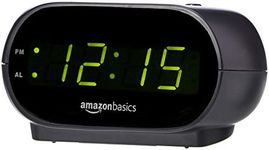
![[Newest Version] 7 Inch Day Clock -](https://images-proxy.bestreviews.guide/0F6YGmyVw6pRUAYZuMte29JHlRU=/0x150/https://m.media-amazon.com/images/I/41jYqgQDkQL._AC_CX679_.jpg)

